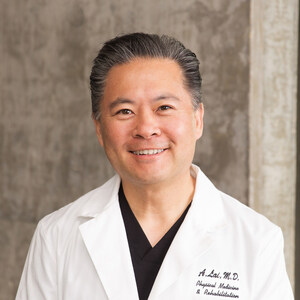Study approved by institutional review board of the Institute of Regenerative and Cellular Medicine.
PENSACOLA, Fla., April 24, 2023 /PRNewswire/ -- Regenative Labs (Regenative), a leading human cell, tissue, cellular and tissue-based products (HCT/P) manufacturer, has partnered with Dr. Michael Lavor to conduct a prospective study on the efficacy and safety of using umbilical cord tissue allografts for Charcot foot. This study has been approved by the institutional review board of the Institute of Regenerative and Cellular Medicine.
Charcot foot, a rare and progressive degeneration of the foot and ankle joints, is an infrequent complication in general diabetic populations. Still, its prevalence escalates to 35 percent in diabetic patients with peripheral neuropathy.
Current treatments for Charcot foot are highly debated, and amputation is the most common standard of care practice. The early stages of Charcot foot are usually treated with a cast or special boot to protect the foot and ankle. The goal of casting is to allow the bones to heal in a stable position and prevent further deformities from developing. However, if these conventional measures fail, amputation may be required. Patients with Charcot foot arthropathy experienced 4.1 amputations per 100 persons.
In Regenative's prospective study, the patient's circumstances are even more uncommon but allow for the observation of Wharton's jelly serving multiple functions in one subject. The patient with known Charcot's foot underwent surgery to investigate and remove a suspected infection. During the operation, no infection was found, but the synovium of the subtalar joint was severed and further macerated by the placement of a post-surgical wound vac. This left the patient with visible synovial fluid leakage and a 3.5cm deep wound down to the bone. The surgeon recommended immediate amputation.
After this recommendation, the patient contacted Dr. Lavor for emergency regenerative intervention to avoid amputation and improve the overall quality of life. Dr. Lavor began Wharton's jelly applications and has seen immense improvement in wound depth, decreasing by 0.4cm, seven days after the first application, giving the patient hope. The study will continue until complete wound closure and will track overall patient progress with MRI, bone scans, and standard wound measuring.
"This patient had an open joint with a ruptured capsule. Wharton's jelly was believed to decrease closure time and increase the healing process by stimulating granulation tissue growth around the opening. It provides a scaffolding that simulates the granulation tissue in the fascia and muscular tissue to close the wound. A total contact cast was used to stabilize the joint with an open window for dressing changes. Since the use of Wharton's jelly, the synovial fluid has decreased by 60 percent to 70 percent, the number of dressing changes has reduced by 30 percent, and the wound has begun closing. The fascial opening has also narrowed in size and increased with granulation tissue," said Dr. Lavor
The results observed in this prospective case study may potentially lay the foundation for the use of Wharton's jelly in other forms of lower limb wounds, such as diabetic foot ulcers, and in other Charcot patients with joint damage. The recording and publication of data in this prospective study may set a precedent for improving Charcot foot and its related wound care.
"We are excited to offer alternatives to the standard care, potentially avoiding a life altering surgery," shared Tyler Barrett, Regenative Labs CEO.
The IRB of the Institute of Regenerative and Cellular Medicine (IRCM) has approved this study. Per standard protocol, if there are complications, all adverse events will be reported to the IRB within 48 hours.
About Regenative Labs: Regenative Labs produces regenerative medicine products to address the root cause of a patient's tissue defect using Wharton's jelly innovations rather than masking the pain with other treatments. Regenative Labs works closely with scientists, physicians, hospitals, and surgery centers to constantly monitor and improve patient progress and outcomes for new product development. Formed by veteran industry professionals familiar with daily challenges of innovations in healthcare, the company provides non-addictive, non-invasive options for patients. Regenative Labs' expert product research and development team complies with FDA guidelines of minimal manipulation for homologous use. The company adheres to AATB and FDA guidelines. Learn more at Regenative's website: www.regenativelabs.com
About Dr. Michael Lavor: Dr. Michael Lavor has worked for over 28 years bringing the highest quality of medicine to his patients. He is currently based out of Arizona, and is planning to open his own practice within the first two quarters of 2023. In addition to his work as Assistant Medical Director at Saguaro Surgical Dr. Lavor was a member of the Trauma Team at Tucson Medical Center where he also served as Chairman of the Department of General and Vascular Surgery. Dr. Lavor was board certified in General Surgery and was a fellow in the American College of Surgeons, past president of the Rocky Mountain Vascular Surgical Society, a Fellow in the Southwestern Surgical Congress, a member of the Tucson Surgical Society, and a member of the International Society of Endovascular Surgery and the Pima County Medical Society. Lavor served in the Navy for ten years as a Navy Corpsman with the Marines; he returned to service in 2009 and served as a Commander / OIC of a wound surgical base in Afghanistan from 2012-2013. He also was a Clinical Associate Professor at the University of Arizona Medical Center Department of Surgery.
SOURCE Regenative Labs

WANT YOUR COMPANY'S NEWS FEATURED ON PRNEWSWIRE.COM?
Newsrooms &
Influencers
Digital Media
Outlets
Journalists
Opted In






Share this article